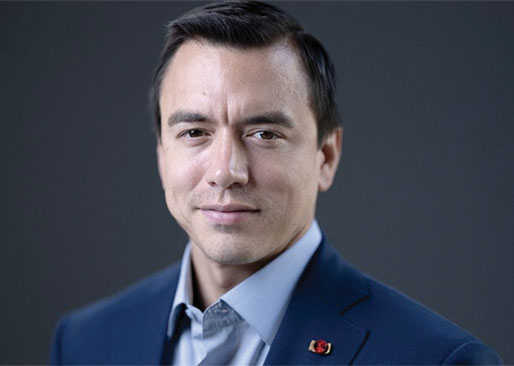The Ecuadorian president commented that he wants to have a fluid and peaceful dialogue, “without intervention on one side or the other”
by the El Reportero‘s wire services
The president of Ecuador, Daniel Noboa, expressed his disagreement that the reestablishment of relations with Mexico, which were broken after the assault by the Ecuadorian public force on the Mexican Embassy in Quito last April, is conditional on the surrender of the former Ecuadorian vice president. Jorge Glas, arrested in that raid when he was taking refuge in the diplomatic headquarters and who is currently in La Roca prison in Guayaquil, province of Guayas.
“It does not seem to me personally or to the Government that the only condition and the only way to re-establish a relationship with Mexico is to give them a criminal,” said the president, in an interview with AFP in Paris, France, within the framework of his tour of Europe.
According to the president, his administration wants to have with Mexico “a fluid dialogue and a dialogue of peace, without intervention on one side or the other”; and he mentioned that they are “willing to talk about many things” and even promoted a free trade agreement with that nation for a long time.
“I think it would be better if we once again have diplomatic relations with Mexico for the fight against drug trafficking, since one of the groups that operate in Ecuador are Mexican cartels,” he said in this regard.
But he insisted that “if there are convicted criminals,” they will not allow “justice to be flouted in that way”; pointing out that Glas, who had already received asylum from Mexico at the time of his capture, “is a person who has been convicted of two criminal offenses, according to Ecuadorian laws in past governments” and “was someone who had been given measures alternatives so that he has house arrest”.
“He went to hide in an embassy. It is the equivalent of someone being in prison, escaping and from there going to take refuge in an embassy. It’s that simple,” he added.
Trust in the ICJ
On the other hand, he was confident that they will be “right” at the International Court of Justice (ICJ), in The Hague, where Mexico filed a complaint against Ecuador and Quito responded with a counter-complaint later.
In that instance, in response to Mexico’s demand, public hearings were held on April 30 and May 1, where both countries presented their arguments.
“I believe that it will end up being clarified within the Court, if the embassy itself was denatured. We trust that we will be right. The moment a criminal is granted asylum, things begin to become intervention in national affairs, especially in national justice, and we do not agree,” he said in this regard.
At the beginning of May, the Secretary of Foreign Affairs of Mexico, Alicia Bárcena, mentioned that if Ecuador gives “safe conduct” and hands over Glas, they could “start” talking to de-escalate the conflict.
In that instance, in response to Mexico’s demand, public hearings were held on April 30 and May 1, where both countries presented their arguments.
“I believe that it will end up being clarified within the Court, if the embassy itself was denatured. We trust that we will be right. The moment a criminal is granted asylum, things begin to become intervention in national affairs, especially in national justice, and we do not agree,” he said in this regard.
At the beginning of May, the Secretary of Foreign Affairs of Mexico, Alicia Bárcena, mentioned that if Ecuador gives “safe conduct” and hands over Glas, they could “start” talking to de-escalate the conflict.
The official then said that Ecuador miscalculated and showed “a lot of inexperience” with the assault on the Embassy and described it as “very poorly done” if Quito understood the granting of asylum to Glas as a provocation by the Mexican authorities.
She recalled that both nations had been talking about it before her country granted the benefit to the former vice president.
“Glas arrived at our embassy on Dec. 17 and requested asylum on December 21. We did not grant it to him without dialogue with Ecuador. It was not a unilateral act by Mexico; we spoke with the Ecuadorian authorities, they themselves sent us the legal files so that we could analyze the request. We studied them and continued with the bilateral dialogue,” he said then.



